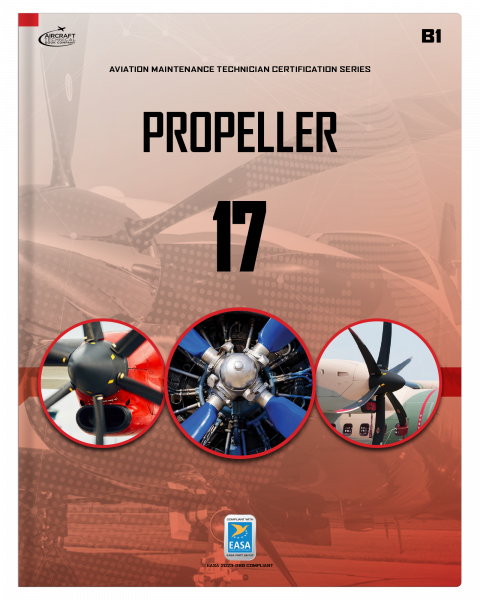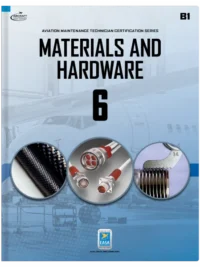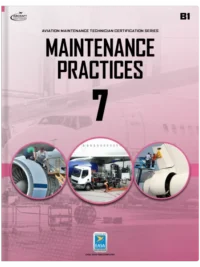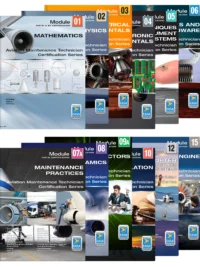Description
EASA Part 66 Module 17 Propellers
EASA Part 66 Module 17 Propellers is an essential resource for Aircraft Maintenance Technicians seeking B1.1 and B1.2 certification. This module strictly aligns with the requirements of Part 66, ensuring that its content, sequence, and necessary learning levels (L1, L2, or L3) meet the standards for an approved B1 mechanic maintenance technician program. It is widely recognized and approved by various national authorities as part of the training curriculum in Part 147 schools.
Each topic within EASA Part 66 Module 17 Propellers is presented with clear, understandable text accompanied by exceptional full-color illustrations. The material is designed to facilitate step-by-step learning, helping technicians grasp crucial concepts and understand the practical applications of each skill in their daily aviation maintenance tasks. While all required topics are addressed for FAA A&P students, this module elevates the level of proficiency to meet EASA licensing standards.
Instructor Services
For educational institutions considering the adoption of EASA Part 66 Module 17 Propellers as core student materials, we offer a range of additional services. These include projectable image banks, comprehensive examination question databases, and extensive support for instructors, catering to the requirements of competent authorities.
Table of Contents
FUNDAMENTALS
- A) Blade element theory
- B) Angle of attack, reverse angle propeller slip
- C) Aerodynamic, centrifugal, and thrust forces
- D) Torque
- E) Relative airflow
- F) Vibration and resonance
PROPELLER CONSTRUCTION
- A) Wood propellers
- B) Metal propellers
- C) Composite propellers
- D) Blade station, face, shank, back, hub assembly
- E) Fixed pitch
- F) Controllable pitch
- G) Constant speed
- H) Propeller spinner installation
PROPELLER PITCH CONTROL
- A) Speed control and pitch change methods, mechanical and electrical
- B) Feathering and reverse pitch
- C) Overspeed protection
PROPELLER SYNCHRONIZATION
- A) Synchronizing
- B) Synchrophasing
PROPELLER ICE CONTROL
- A) Fluid and electrical de-icing equipment
PROPELLER MAINTENANCE
- A) Static and dynamic balancing
- B) Blade tracking
- C) Assessment of blade damage, erosion, corrosion, impact damage, delamination
- D) Propeller treatment and repair schemes
- E) Propeller engine running
STORAGE AND PRESERVATION
More
EASA Part 66 Module 17 Propellers: An Overview
The EASA Part 66 Module 17 Propellers is an essential component of the aviation maintenance curriculum, focusing on propeller systems and technologies vital for aircraft performance. This module provides in-depth knowledge necessary for understanding EASA module 17 propeller systems, covering everything from basic concepts to advanced applications.
For those seeking part 66 propeller training, this module aligns with the standards set by EASA, ensuring that technicians are well-prepared for certification. The EASA propeller maintenance course included in this training equips students with the skills to effectively maintain and troubleshoot aviation propellers. Successful completion leads to EASA part 66 propeller certification, a credential recognized across the industry.
Key Topics Covered
- Module 17 Propeller Technology: Gain insights into the latest advancements in aviation propeller systems EASA.
- EASA Part 66 Propeller Theory: Understand the theoretical underpinnings of propeller performance and design.
- Propeller Performance EASA: Explore metrics and benchmarks for evaluating propeller efficiency.
- EASA Module 17 Exam Preparation: Comprehensive resources are available to help candidates prepare for the EASA module 17 exam.
- Part 66 Aviation Propellers: A thorough examination of propeller types, configurations, and operational applications.
Practical Skills Development
The program emphasizes practical skills, focusing on EASA propeller troubleshooting and propeller operational theory EASA. Students learn effective propeller maintenance techniques EASA, essential for ensuring optimal aircraft operation. The curriculum also covers EASA part 66 propeller inspection, teaching technicians how to identify and rectify issues that may affect safety and performance.
Training Resources
For those enrolled in this module, EASA module 17 training resources provide valuable support, including manuals, guides, and hands-on training opportunities. The EASA module 17 course content is structured to enhance learning and ensure thorough understanding.
Exam and Certification
Preparation for the EASA module 17 exam guide is critical, as it ensures that students are well-equipped for the certification process. The propeller maintenance certification EASA signifies a technician’s proficiency in handling propeller systems and is a crucial step in advancing their career.
Specialized Knowledge Areas
In addition to the foundational topics, the module covers propeller dynamics EASA and propeller system performance EASA. Students learn about the latest propeller specifications and design principles EASA, which are critical for developing new and improved propeller technologies.
Conclusion
The part 66 propeller systems training offers a comprehensive pathway for aviation professionals aiming to specialize in propeller technology. By utilizing the EASA module 17 study guide, students can reinforce their knowledge and enhance their skills, ensuring a successful career in aircraft maintenance. Whether you are preparing for exams or seeking to improve your practical skills, the resources provided will support your journey in mastering EASA aircraft propeller training.
Tags aviation propeller systems easa, easa aircraft propeller training, easa module 17 course content, easa module 17 exam guide, easa module 17 exam preparation, easa module 17 propeller systems, easa module 17 study guide, easa module 17 training resources, easa part 66 module 17 propellers, easa part 66 propeller certification, easa part 66 propeller inspection, easa part 66 propeller specifications, easa part 66 propeller study materials, easa part 66 propeller theory, easa propeller maintenance course, easa propeller technology overview, easa propeller troubleshooting, module 17 propeller regulations, module 17 propeller technology, part 66 aviation propellers, part 66 propeller operational procedures, part 66 propeller systems training, part 66 propeller training, propeller design principles easa, propeller dynamics easa, propeller maintenance certification easa, propeller maintenance techniques easa, propeller operational theory easa, propeller performance easa, propeller system performance easa










Reviews
There are no reviews yet.